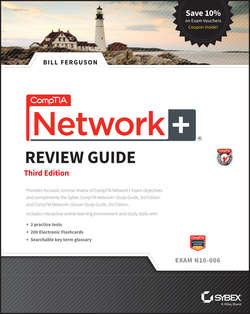Читать книгу CompTIA Network+ Review Guide - Ferguson Bill - Страница 15
На сайте Литреса книга снята с продажи.
Introduction
Chapter 4: Domain 4 Troubleshooting
Оглавление✓ 4.1 Given a scenario, implement the following network troubleshooting methodology:
■ Identify the problem
■ Gather information
■ Duplicate the problem
■ Question Users
■ Identify symptoms
■ Determine if anything has changed
■ Approach multiple problems individually
■ Establish theory of probable cause
■ Question the obvious
■ Consider multiple approaches
■ Top-to-bottom/bottom to top of OSI Model
■ Divide and conquer
■ Test the theory to determine cause
■ Once theory is confirmed, determine the next steps to resolve the problem
■ If theory is not confirmed, re-establish new theory or escalate
■ Establish a plan of action to resolve the problem and identify potential effects
■ Implement the solution or escalate as necessary
■ Verify full system functionality and if applicable implement preventative measures
■ Document findings, actions, and outcomes
✓ 4.2 Given a scenario, analyze and interpret the output of troubleshooting tools
■ Command line tools
■ ipconfig
■ netstat
■ ifconfig
■ ping/ping6/ping-6
■ tracert/tracert-6/traceroute6/traceroute-6
■ nbtstat
■ nslookup
■ arp
■ mac address lookup table
■ pathping
■ Line testers
■ Certifiers
■ Multimeter
■ Cable tester
■ Light meter
■ Toner probe
■ Speed test sites
■ Looking glass sites
■ WiFi analyzer
■ Protocol analyzer
✓ 4.3 Given a scenario, troubleshoot and resolve common wireless issues
■ Signal loss
■ Interference
■ Overlapping channels
■ Mismatched channels
■ Signal-to-noise ratio
■ Device saturation
■ Bandwidth saturation
■ Untested updates
■ Wrong SSID
■ Power levels
■ Open networks
■ Rogue access point
■ Wrong antenna type
■ Incompatibilities
■ Wrong encryption
■ Bounce
■ MIMO
■ AP placement
■ AP Configurations
■ LWAPP
■ Thin vs. thick
■ Environmental factors
■ Concrete walls
■ Window film
■ Metal studs
■ Wireless standard related issues
■ Throughput
■ Frequency
■ Distance
■ Channels
✓ 4.4 Given a scenario, troubleshoot and resolve common copper cable issues
■ Shorts
■ Opens
■ Incorrect termination (mismatched standards)
■ Straight-through
■ Crossover
■ Crosstalk
■ Near end
■ Far end
■ EMI/RFI
■ Distance limitations
■ Attenuation/Db loss
■ Bad connector
■ Bad wiring
■ Split pairs
■ Tx/Rx reverse
■ Cable placement
■ Bad SFP/GBIC-cable transceiver
✓ 4.5 Given a scenario, troubleshoot and resolve common fiber cable issues
■ Attenuation/Db loss
■ SFP/GBIC-cable mismatch
■ Bad SFP/GBIC-cable or transceiver
■ Wavelength mismatch
■ Fiber type mismatch
■ Dirty connectors
■ Connector mismatch
■ Bend radius limitations
■ Distance limitations
✓ 4.6 Given a scenario, troubleshoot and resolve common network issues
■ Incorrect IP configuration/default gateway
■ Broadcast storms/switching loop
■ Duplicate IP
■ Speed and duplex commands
■ End-to-end connectivity
■ Incorrect VLAN assignment
■ Hardware failure
■ Misconfigured DHCP
■ Misconfigured DNS
■ Incorrect interface/interface misconfiguration
■ Cable placement
■ Interface errors
■ Simultaneous wired/wireless connections
■ Discovering neighboring devices/nodes
■ Power failure/power anomalies
■ MTU/MTU black hole
■ Missing IP routes
■ NIC teaming misconfiguration
■ Active-active vs. active-passive
■ Multicast vs. broadcast
✓ 4.7 Given a scenario, troubleshoot and resolve common security issues
■ Misconfigured firewall
■ Misconfigured ACLs/applications
■ Malware
■ Denial of service
■ Open/closed ports
■ ICMP related issues
■ Ping of death
■ Unreachable default gateway
■ Unpatched firmware/OSs
■ Malicious users
■ Trusted
■ Untrusted users
■ Packet sniffing
■ Authentication issues
■ TACACS/RADIUS misconfigurations
■ Default passwords/settings
■ Improper access/backdoor access
■ ARP issues
■ Banner grabbing/OUI
■ Domain/local group configurations
■ Jamming
✓ 4.8 Given a scenario, troubleshoot and resolve common WAN issues
■ Loss of internet connectivity
■ Interface errors
■ Split horizon
■ DNS issues
■ Interference
■ Router configurations
■ Customer premise equipment
■ Smart jack/NIU
■ Demarc
■ Loopback
■ CSU/DSU
■ Copper line drivers/repeaters
■ Common security policy
■ Throttling
■ Blocking
■ Fair access policy/utilization limits
■ Satellite issues
■ Latency
